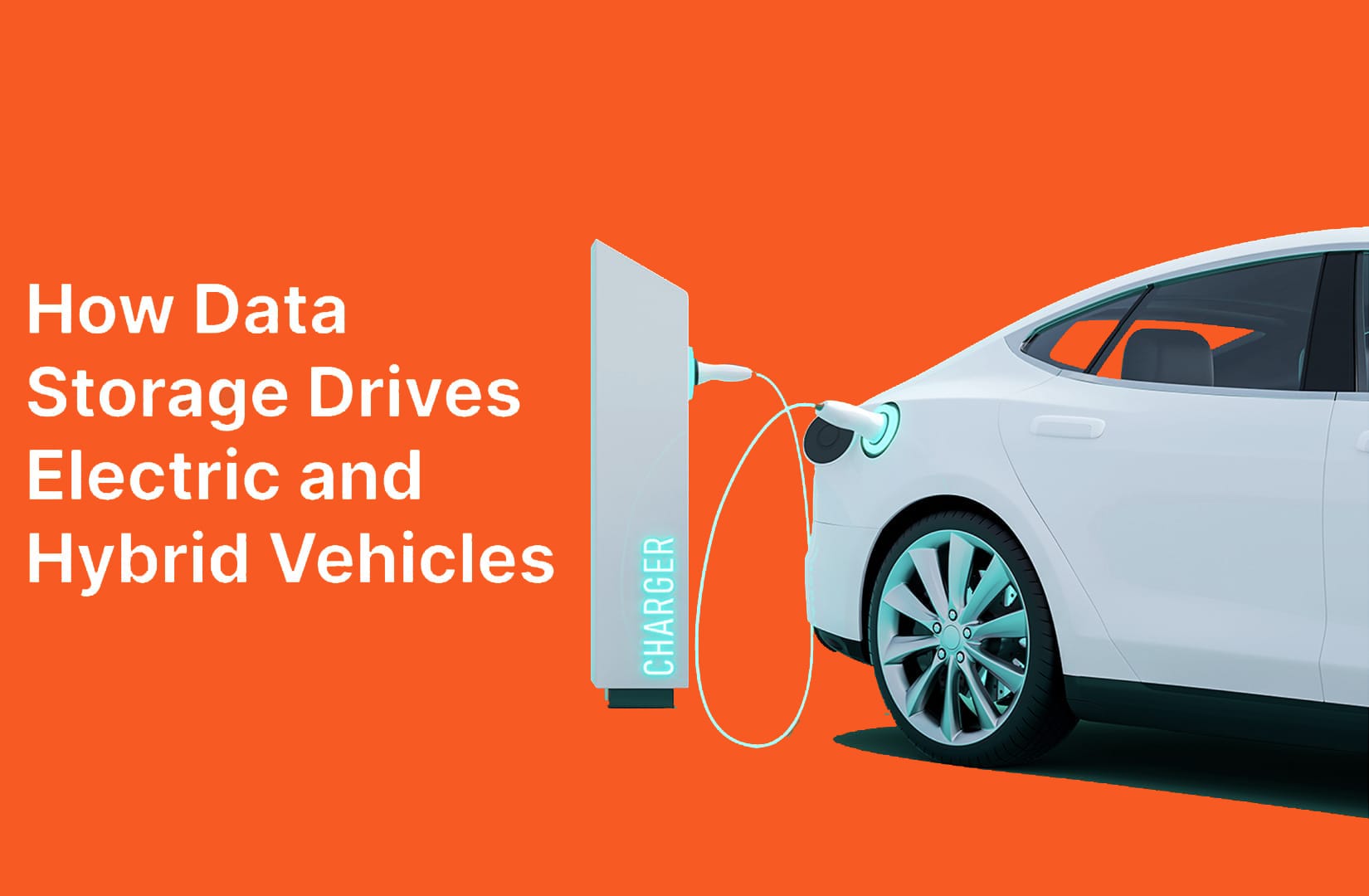The automotive industry is headed the direction of electric cars. There’s no shortage of stats on where this industry is going: More than 2.3 million electric cars were sold in the first quarter of 2023, about 25% more than in the same period of 2022. McKinsey predicts the electric vehicle market will end up growing sixfold between 2021 and 2030—to roughly 40 million annual units sold from 6.5 million.
But, as always, with great growth and great opportunity come great challenges. Let’s take a look at the data storage-specific challenges around electric and hybrid vehicles and what they mean for automotive industry companies seeking to take full advantage of this industry’s skyrocketing potential.
The Electric Revolution and Its Data-demanding Nature
Electric and hybrid vehicles rely heavily on data to function optimally. From battery management and energy consumption monitoring to regenerative braking and real-time performance analysis, these vehicles generate a wealth of data that must be effectively managed, stored, and processed. The transition from conventional internal combustion engines to electric powertrains has necessitated a fundamental shift in how data is stored and utilized.
Lack of Standardized Data Formats
A key issue around data from cars is lack of standardization. Every car maker captures data differently, making it extremely hard to analyze this data in bulk. The carmakers are also hesitant to share their data. As such, a lot of them are increasingly taking data analytics in-house.
Battery Management and Monitoring
The heart of an electric or hybrid vehicle is its battery. Efficient battery management is crucial for vehicle performance, range optimization, and longevity. Batteries continuously generate vast amounts of data related to state of charge (SoC), state of health (SoH), and temperature. This data must be stored and analyzed to ensure that the battery operates within safe parameters and delivers optimal performance over its lifespan.
Energy Efficiency and Optimization
Data storage solutions play a pivotal role in enhancing energy efficiency in electric and hybrid vehicles. These vehicles often employ regenerative braking systems that convert kinetic energy into electric energy for recharging the battery. The efficiency of these systems relies on real-time data analysis to determine when to engage regenerative braking and how much energy to recover. Effective data storage solutions enable rapid data processing, contributing to improved energy recovery and extended driving range.
Charging Data and Infrastructure
Charging infrastructure is a critical factor for the widespread adoption of electric vehicles. Data storage challenges arise here, too—for managing the vast amounts of data generated during charging sessions. Charging stations collect data on power delivery, charging times, and payment transactions. This data is not only valuable for users but also for optimizing the charging network’s performance and availability. Data storage solutions must ensure the secure and efficient management of this data for a seamless charging experience.
Pure Storage’s Response: Data Management for a New Era
Addressing the unique data storage challenges in electric and hybrid vehicles requires innovative solutions, and Pure Storage is at the forefront of this endeavor. Software and AI are what underpin car electrification and deliver technology advances. By leveraging cutting-edge technologies, Pure Storage is developing data storage solutions tailored to the software and AI demands of the automotive industry’s electric revolution.
High-speed Data Processing
Modern automobiles generate vast amounts of data. Pure Storage solutions enable high-speed data processing, reducing time to insights for critical vehicle data. This capability is essential for optimizing energy consumption, enhancing battery performance, and ensuring a safe driving experience.
Robust Reliability
Data processing never sleeps. Downtime delays projects and can have substantial financial costs. Pure Storage solutions are extremely resilient and minimize downtime. Even failed components can be replaced non-disruptively to keep data pipelines flowing.
Data Security
With the increasing connectivity of vehicles, data security is paramount. Pure Storage implements advanced security measures to safeguard sensitive data, maintaining user privacy and protecting against potential cyber threats via a resiliency architecture.
Scalability
As electric and hybrid vehicles become more mainstream, the volume of data generated will continue to grow. Pure Storage’s scalable solutions accommodate this growth, offering flexible storage options that adapt to evolving automotive data needs.
How NavInfo Supports Global Car Manufacturers with Pure
NavInfo (Europe) B.V., a key player in providing navigation systems and support for autonomous driving to global car manufacturers, relies on AIRI® for advanced AI analysis of extensive data sets.
Employing AI and deep learning, NavInfo utilizes AIRI, an integrated AI infrastructure based on NVIDIA DGX-1 and Pure Storage® FlashBlade®, to develop highly accurate real-time maps and navigation models. This infrastructure enables the efficient processing of large data sets, with FlashBlade ensuring rapid read and write speeds crucial for intricate AI calculations, alleviating potential bottlenecks.
The adoption of AIRI has resulted in the ability to develop and execute precise, complex AI models for navigation purposes, leading to an optimal utilization of NVIDIA DGX-1 GPUs and a high return on investment (ROI). Moreover, NavInfo benefits from a low total cost of ownership (TCO), allowing effective cost control.
This IT transformation facilitates faster innovation and the development of new navigation services, with highly complex AI models running efficiently to power navigation services. The versatility of AIRI allows AI tasks to operate seamlessly on any available server, achieving over 80,000 IOPS (input/output operations per second).
Conclusion
The rise of electric and hybrid vehicles signifies a transformative phase in the automotive industry, demanding innovative solutions to data storage challenges. From battery management to energy efficiency and charging infrastructure, data storage plays a pivotal role in ensuring the success of these eco-friendly vehicles.
With its commitment to cutting-edge technology, Pure Storage is paving the way for a future where electric and hybrid vehicles seamlessly integrate data-driven functionalities, enhancing both the driving experience and environmental sustainability.
Pave the Way
Set your organization up for success with automotive data solutions from Pure Storage.








